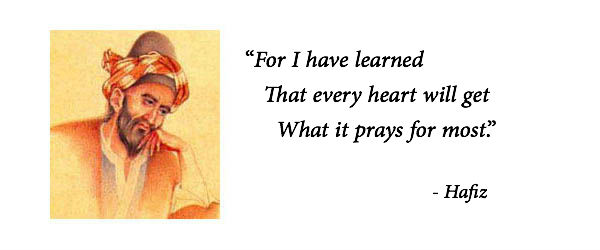Born in 1315, Shamseddin Mohammad, known as Hafiz, grew up in the city of Shiraz where he studied Qur’anic sciences. In his youth he learned the Quran rigorously and assumed the epithet ‘Hafiz’ which means the one who knows the Quran by heart.
Also known as the ‘Tongue of the Hidden’ and the ‘Interpreter of Secrets’, Hafiz utilizes grand religious ideas and mingles them with Sufistic teachings, thereby creating a kind of poetry which baffles interpretation.
An undisputed master of ghazal, Hafiz brought the poetic form to perfection in Persian literature. “Ghazal” in Arabic means talking to women, philandering, narrating about youth, and praising women.
Hafiz Poetry
 Idiomatically, ghazal is a poetic expression which consists of a number of rhythmic couplets (generally seven couplets), the closing lines of which rhyme with the opening lines Matla’ or opening verse of the couplet.
Idiomatically, ghazal is a poetic expression which consists of a number of rhythmic couplets (generally seven couplets), the closing lines of which rhyme with the opening lines Matla’ or opening verse of the couplet.
The last couplet of ghazal is called maqta’ or final verse in which the poet generally gives his poetic and pen name, which is technically called takhallus or sobriquet (Tamimdari, 2002 p. 172).
The ghazal revolves around the beauty, frivolity and cruelty of the beloved and the saga of separation and suffering of the lover. Hafiz employs ghazal because it is the best poetic form for expressing mystical ideas in Persian literature.
An underlying force in the poetry of Hafiz is Sufism, a mystical movement which can be traced to Zoroastrianism, Nestorian Christianity, Greek Neoplatonism, and Indian Buddhism.
From Sufism, Hafiz drew his charming images and profound ideas. This mystical system heavily relies on pantheism according to which each soul is part of the Divine Being and the Sufi seeks complete union with the Divine.
This union is made possible in the knowledge that a human being is the ultimate reality which he seeks. In one of his poems, Hafiz indicates great admiration for Hallaj, a Persian mystic who was brutally tortured and executed on charges of heresy and whose ashes were thrown into the Tigris River.
Hallaj professed pure pantheism when he said, “I am the Truth.” This theophanic locution was literally interpreted as meaning “I am God” by the then ruling religious authorities who made him suffer a tragic destiny.
In his poem, Hafiz openly sympathises with Hallaj and states that his only sin was that he revealed the secret: “That friend, by whom the gibbet’s head grew high,/Did wrong when he to others told the secrets of the sky.”
It is narrated that a Sufi once asked God why He allowed such punishment and was answered: This is the way the revealers of secrets are punished.
The world, to Hafiz, is an enigma which is inconceivable to the wise and unwise alike: “Of minstrels and of wine discourse; care little how the skies revolve:/By wisdom no one has solved yet and shall not this enigma solve.”
No living being has the capacity to ‘lift the veil’ and say ‘who is ugly or who is fair.’ Hafiz believes that under the azure vault of the heaven, no one is allowed to despair of God’s mercy and no one is allowed to steal another’s hope for Divine Clemency “Never of Eternal Mercy preach that I must yet despair;/Canst thou pierce the veil, and tell me who is ugly, who is fair?”
Everywhere, no matter a tavern or the shrine, becomes a place of worship for those who solicit the company of the Beloved (God): “Everyone the Friend solicits, be he sober, quaff he wine;/Every place has love its tenant, be it or the mosque, or shrine.”
A sworn enemy of the hypocritical ascetics, Hafiz satirizes their insincerity in his poetry. This antagonistic attitude was enough to provoke the ire of the authorities who accused him of having heretical beliefs.
The hypocritical clerics who were exasperated by Hafiz’s castigations of their insincerity refused to have him buried in a Muslim cemetery. Yet, Hafiz’s fervid supporters argued with them and decided that they consult his Divan for a solution. A child was assigned to open at random his Divan (Book of Poems). The poem the child came across was ghazal 60 which ended thus: “And when the spirit of HAFIZ has fled,/Follow his bier with a tribute of sighs;/Though the ocean of sin has closed o’er his head,/He may find a place in God’s Paradise.”
Consulting his divan as an oracle has become common practice since then. His body was then laid to rest in a garden of roses at the foot of a cypress tree in Shiraz which he had purportedly planted.
Love as the Ultimate Goal
Love constitutes the cornerstone of Hafiz’s poetry. To him, love is the alchemy of eternal bliss. Love is generally taken to be a reference to God in his poetry. Therefore, he uses the male pronoun in speaking of love.
Love is perfect and absolute. If there is any fault, it has to be traced to man. The Beloved does not need our love: “My Loved one’s beauty has no need of an imperfect love like mine: By paint or powder, mole or streak, can a fair face more brightly shine?” He is full of grace and tyranny.
The Beloved can be seen and in order to observe Him, one should be pure in heart. Love is a divine trust particular to man: “Heaven, from its heavy trust aspiring to be free,/The duty was allotted, mad as I am, to me.”
Love may seem easy at first but one has to persevere in the arduous path of love if one really seeks it: “O Cupbearer! Pass round and offer thou the bowl/For the love which at first seemed easy, has now brought trouble to my soul.”
One has to wash one’s hands off the world once he has found true love (God): “As soon as thou hast found thy Loved one,/”Bid to the world a last farewell.”
By love, the soul of man is immortalized and flows into eternity: “He whose soul by love is quickened, never can to death be hurled:/Written is my life immortal in the records of the world.”
Hafiz takes delight in the fact that true love may not come his way easily but only in a dream. Even so, such a dream is so pleasurable: “In a dream, to the abode of the Beloved did I wend:/Oh happy the dream where I see the Darling Friend.” In short, love is only to be found by placing trust in God.
The knowledge of God is the prerequisite to the attainment of love. Even prayer finds its true meaning when it is accompanied by love. In the eyes of Hafiz, we are all the beggars of love and we should make every endeavor to gain the Grace of the Almighty who is the Absolute Beloved.
We should never lose patience in our quest for the Beloved even though our please and cries are left unanswered by the Beloved (God) for He is endowed with immeasurable beauty and grace. Everything in nature is a manifestation of God’s love.
According to the Sufis, God created the world as a mirror to reflect His grandeur and glory. This idea is firmly rooted in a divine hadith or tradition which says: “I was a hidden Treasure and I desired to be known so I created a creation to which I made Myself known; then they knew Me.” A divine hadith, by definition, is one which is narrated through the tongue of the Holy Prophet but is a direct revelation from God Himself.
Character Types in Hafiz’s Poetry
A term which recurs in the poetry of Hafiz with philosophical overtones is the Persian word rind which means libertine or profligate. Rind is obviously one of his favorites.
This word, variably translated as rake, profligate, libertine and debauchee, has come to bear mystical significations. He uses this term in reference to a person who has an apparently contradictory character while in reality he is a normal person.
A rind has religious commitments, contemplates on divine salvation, broods on the Hereafter but he is not afraid of it because he believes that love is the only solution to all human predicaments. He believes that doubt is an antidote to intellectual passivity.
A rind is not a teacher of morality but he believes that salvation lies in the captivity of love. A rind has achieved knowledge of the world beyond: “The mystery beyond the Veil, ask of rapt rev’lers of the bowl/Knowledge of this were vainly sought from the staid zealot’s lofty soul.”
A rind mistrusts the world, and knows that her ways are fickle and her promises false: “Mistrust the World, her ways are fickle, her promises belied; /”Of thousand lovers has this beldam been till to-day the bride.”
A rind is in fact a toper who dwells in the tavern. For a rind, the tavern turns into a place of worship where he imbibes the wine of spiritual knowledge in the presence of the tavern keeper who is the Grand Teacher. It is in the tavern where a rind may be able to receive messages from God: ‘Would’st thou be told how, in the tavern yest’r-eve, when soaked in wine,/I heard glad tidings from an envoy sped from the world divine?’ For him, wine is a means to bring about spiritual intoxication with and proximity to God. Wine is also a symbol of perfection: “Come Saki, for that trancing wine I sue,/The source of bounty, and perfection too.”
The character of the zealot is juxtaposed with the rind. In the eyes of Hafiz, a zealot may cleanse himself of the impurities of the world by clinging to an ascetic life. But he is deluded by arrogance and vanity on account of his purity.
This feeling of arrogance is per se a sin in the creed of Hafiz. The zealot eschews the pleasures of life and wallows in his hidebound beliefs. It is he who despairs Man of the Divine Grace and draws him into a vortex of blind prejudice: “Never of Eternal Mercy preach that I must yet despair;/Canst thou pierce the veil, and tell me who is ugly, who is fair?”
At this point, Hafiz makes an indirect reference to the Holy Qur’an (39:53) which says, “Say: O my Servants who have transgressed against their souls! Despair not of the Mercy of Allah: for Allah forgives all sins: for He is All-Forgiving, Most Merciful.”
Therefore, Hafiz shuns the company of the Sheikhs, jurists and the zealots who keep people away from God by striking the fear of the Doomsday into their hearts. Hafiz is a great enemy of religious hypocrisy and keeps chastising the duplicity of the preachers: “On the pulpit, preachers, goodness display/Yet in private, they have a different way.”
Religious hypocrisy is odious to Hafiz. Yet he speaks highly of those who tread on the path of religion with purity of heart.
The spiritual enlightenment which Hafiz attained travelled beyond the borders of Iran and influenced a number of great minds in the West, among them, Goethe, Nietzsche, Platen, Pushkin, Emerson, and Dickenson to mention only a few.





Be the first to comment on "Hafiz, the ‘Interpreter of Secrets’"